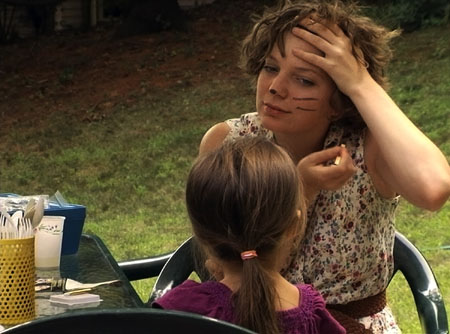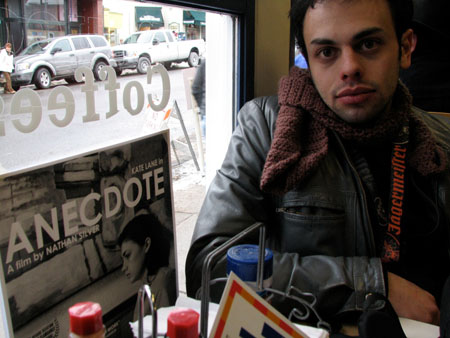 Back to selection
Back to selection
Five Questions with Exit Elena Director Nathan Silver

“Sorry to put you in the middle of this,” says Cindy Akerman (Cindy Silver) to Elena (Kia Davis), as they sit at breakfast and she argues with her husband about her decision to hire Elena as a live in nurse for his mother without telling him. And so it begins. At 71 minutes long, filmmaker Nathan Silver’s Exit Elena is an exquisite gem of a movie. We watch as Elena is dragged into the dysfunction of family life and struggles to maintain her professional role looking after the elderly Florence (Gert O’Connell) while her employer drags her along to zumba class.
It’s a gentle yet unswerving examination of relationships that blur the boundary between personal and professional, and the tension never lets up for a moment despite the lack of any dramatic artifice beyond the circumstances. Elena is a mysterious creature, compelling in her opacity which exists as a stark contrast to Cindy’s consistently insistent desire for connection.
After studying Dramatic Writing at NYU’s Tisch School of the Arts, Silver made four shorts and a feature using scripts, and then tossed them away for this, his second feature. As it receives its world premiere at the Edinburgh International Film Festival this week, we got to ask Silver five questions.
Filmmaker: You are credited with writing the script with lead actor Kia Davis, who plays Elena. How did this process begin, and did it end on the page or was there much improvisation on set?
Silver: Like most things, this process came about out of frustration. I had a film fall apart on me the first day of shooting. It was just a disaster. It was a disaster because I’d tried to do a movie without a script, and the actors and crew didn’t react well to the chaotic nature of it all. I had no idea what I was doing. Before this, I’d always made heavily scripted movies. Hell, I went to NYU for screenwriting. Then I tried this outlined, amorphous endeavor, and it just went terribly wrong. I realized that if I were going to figure out this new mode of moviemaking, I would have to work out the kinks with those closest to me—those who couldn’t just get up and leave. So I turned to Kia (my girlfriend at the time), my mother, and various family friends. I worked out characters with these folks, rehearsed the hell out of them, and Kia and I got an outline on paper three days before shooting began. So there was no script. I would nudge and shove the flow of the scenes and characters, but the dialogue’s improvised.
Filmmaker: You play “Nathan” in the film, and your mother Cindy plays “Cindy.” How autobiographical is the film, and what was it like working with your mother?
Silver: On a very basic level, my mother and I used our real names, because we felt silly calling each other by anything else. We were playing exaggerated versions of ourselves anyway. There are certainly autobiographical elements mixed into it, but this particular story never happened to us. My grandmother never lived in our house. There was never a nurse aide in the house. But the general sentiments all stem from my life and the actors’ lives. As for getting along with my mother…well, she’s my biggest supporter but as soon as I started telling her what to do, the rebel in her came out – she saw me as the dictator director. We fought like we always do, with great love, but it didn’t make for a calm shoot. In fact, the only person who was not a family member or family friend disappeared midway through because she started having panic attacks whenever she came on set.
Filmmaker: The often surprising behavior of the characters give them, and the film, an authenticity that maintains the tension of the story. Were you ever tempted, or advised to include more dramatic fodder?
Silver: No. Once we had the outline, I had faith in the absurd so to speak. I mean, I also had no one to answer to because it was self-financed. If you were to describe this movie to someone, they might not want to see it. “A story about a nurse aide…well, that sounds boring.” But as you’ve seen, the story is not about a nurse aide. The story exists on top of, below, and around everything we’re seeing. This stems from how I experience my life. I can be in the loveliest of places with the loveliest of people, but I’ll still have a pit in my stomach and I won’t be able to enjoy a thing. I can’t predict how certain environments and people will make me feel. That’s life. I want to make movies about life. Life’s more important to me than drama. Also, drama’s inherent to life, so…
Filmmaker: You’ve said that Buñuel made you want to be a filmmaker. What is it about his films, and where in your own work do you think we can see his influence?
Silver: I’ve never gotten through one of his movies (with the exception of Robinson Crusoe) without aching from laughter afterwards. I live to laugh. And I just think he’s the funniest of them all. He’s an elegant craftsman, whereas I craft situations at the expense of technical elegance. In that we certainly differ. But he understood that life’s a joke we must take seriously, and I couldn’t agree more with that. I hope that that’s apparent in my movies.
Filmmaker: You’re in postproduction on your third feature now, Soft in the Head. Can you tell us a bit about that?
Silver: At one point I wanted to do a straight-up adaptation of The Idiot by Dostoevsky, but I couldn’t wrap my head around it. Everything I put down on paper felt stilted and stale. One day, I met a man who resembled the main character in the book. That’s when it gelled. I didn’t care about the plot of the book; the characters are what got me. I just had to gather up their real-life equivalents and see how these real-life equivalents reacted to each other. So that’s what I did. Basically, the movie is a 70-minute anxiety attack about an unhinged young woman, an older man who’s too kind for his own good, a Jewish family, a men’s home, and the surly city of New York.
I’m also in the midst of prepping my next movie, Gun Under My Pillow, which is about how we’re like cockroaches when it comes to love. We can survive emotional nuclear bombs and scurry right on ahead.


